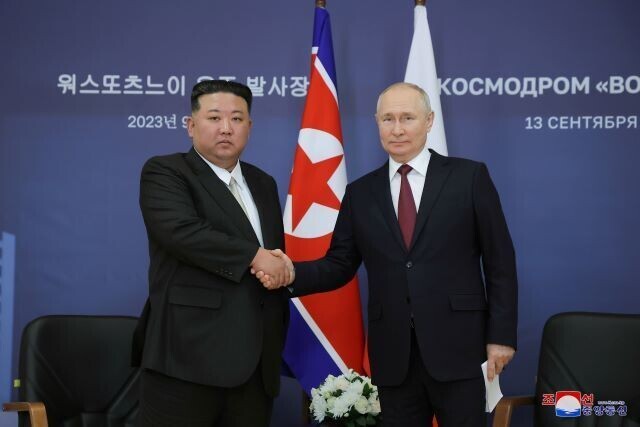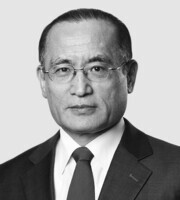hankyoreh
Links to other country sites 다른 나라 사이트 링크
[Guest essay] As someone who helped forge Seoul-Moscow ties, their status today troubles me


By Wi Sung-lac, former South Korean ambassador to Russia
Seoul-Moscow ties are at their worst point since the two countries established diplomatic relations. But Moscow’s relationship with Pyongyang is getting chummier by the day.
I was one of the diplomats in charge of establishing relations with Russia in the late 1980s, as the Cold War drew to a close. Because of that personal connection, the two countries’ fraying ties are especially troubling for me.
Russia was the country that launched the post-Cold War era through its policies of glasnost and perestroika. Russia placed more weight on its relationship with South Korea than North Korea back then.
Later, Russia adjusted its relationship with South and North Korea while adopting an adversarial stance to the West, fearing it would be overrun.
That led to the outbreak of the war in Ukraine. South Korea joined Western sanctions against Russia, but North Korea — which has been at odds with South Korea and the US since negotiations broke down in the Trump-Kim summit in Hanoi — has actively supported and lent Russia its hand in the war.
Amid these geopolitical changes, South Korean President Yoon Suk-yeol boosted security cooperation with the US and Japan at the three countries’ trilateral summit at Camp David.
Given Russia’s grave fears about a US-led security arrangement in the region, Russia began to push back through a partnership with North Korea. Military cooperation between the two countries was highlighted by their summit last year, and they now appear to be trading weapons, food, energy and technology.
That kind of cooperation between Russia and North Korea will have a negative impact on South Korean security. First, Russian aid will help North Korea keep improving its nuclear weapon and missile programs, while also continuing to cripple the international sanctions regime.
Second, North Korea will upgrade its conventional weapons, giving it more options for making provocations. North Korea and Russia could cooperate not only on surveillance satellites but also on submarines and jet fighters.
Third, North Korea and Russia could elevate their security cooperation to another level. They could treat Putin’s visit to North Korea as an opportunity to unveil a legal foundation for security cooperation that goes beyond what was announced at Camp David.
Fourth, stronger ties between North Korea and Russia could dovetail with solidarity between China and Russia.
The ultimate result will be growing antagonism between the two camps of South Korea, the US and Japan on the one side, and North Korea, China and Russia on the other. That will make it even harder for South Korea to pursue its foreign policy objectives of denuclearization, establishment of a peace regime and reunification for the peninsula. When North Korea and Russia stand in the way, those tasks become impossible.
That makes it essential to take appropriate action. Our goal should be to keep Russia from flouting UN Security Council resolutions and undermining our security through military cooperation with North Korea and thereby prevent a rupture in Seoul-Moscow relations and open a path to restoring our bilateral relations.
As for what form those measures should take, there’s a tendency to hope that China will play a role, based on the assumption that China frowns upon closer ties between Russia and North Korea.
But China probably won’t swing into action. China values its own relationship with Russia far too much and seems apathetic about the UN Security Council resolutions regarding North Korea.
But if the US were to demonstrate its strategic resolve to cooperate with China in certain areas and pinpoint the North Korean nuclear program as one of the areas for cooperation, the situation would change. The question is whether that’s even possible under the US and China’s current relationship.
Some South Koreans hold the rather complacent view that since we have strengthened our alliance with the US, improved relations with Japan and achieved trilateral security cooperation with the US and Japan, we can deal with these issues through eventual dialogue with Russia from a position of advantage.
But that kind of unhurried approach is unlikely to accomplish much when Russia is deliberately shunning South Korea since Seoul-Moscow relations are already being undermined by South Korea’s stronger relations with the US bilaterally and with the US and Japan trilaterally amid Russia’s fierce antagonism with the US.
A good example is Russian Deputy Foreign Minister Andrey Rudenko’s visit to South Korea. Rudenko’s talks with his South Korean counterpart had been planned with great care, but they were rendered moot amid mutual recriminations after the spokesperson of the Russian Foreign Ministry made remarks critical of South Korea. That illustrates the numerous factors capable of hindering dialogue between the two sides.
These circumstances demand a more concerted and strategic approach from South Korea. Rather than taking one issue at a time, we need a holistic approach based on an integrated and coordinated strategy for relations with the US and Russia. Our strategy should stipulate the extent of cooperation with the US and the amount of latitude in our diplomacy with Russia, based on Korea’s unique interests.
That strategy should serve as the basis for devising more detailed tactics, both soft-line and hard-line. Soft-line tactics include adjusting our level of cooperation with the US on Russia and then using the resulting leeway to carry on fundamental exchange with Russia that can give us leverage for dissuasion. Hard-line tactics include considering measures that Russia strongly opposes as a way of ratcheting up dissuasion.
If Donald Trump is elected president in the US, Korea will have more room for employing both soft-line and hard-line tactics.
Cooperating with the US and Japan while managing relations with North Korea, China and Russia is both a duty and a dilemma for South Korea.
Since Russia has moved forward with improving ties with North Korea, we cannot delay our response. But dialogue alone is unlikely to either contain Russia’s actions or create an opportunity to turn things around given the current deterioration of our bilateral relations. It’s time to consider a new approach.
Please direct questions or comments to [english@hani.co.kr]

Editorial・opinion
![[Column] Season 2 of special prosecutor probe may be coming to Korea soon [Column] Season 2 of special prosecutor probe may be coming to Korea soon](https://flexible.img.hani.co.kr/flexible/normal/500/300/imgdb/original/2024/0426/3317141030699447.jpg) [Column] Season 2 of special prosecutor probe may be coming to Korea soon
[Column] Season 2 of special prosecutor probe may be coming to Korea soon![[Column] Park Geun-hye déjà vu in Yoon Suk-yeol [Column] Park Geun-hye déjà vu in Yoon Suk-yeol](https://flexible.img.hani.co.kr/flexible/normal/500/300/imgdb/original/2024/0424/651713945113788.jpg) [Column] Park Geun-hye déjà vu in Yoon Suk-yeol
[Column] Park Geun-hye déjà vu in Yoon Suk-yeol- [Editorial] New weight of N. Korea’s nuclear threats makes dialogue all the more urgent
- [Guest essay] The real reason Korea’s new right wants to dub Rhee a founding father
- [Column] ‘Choson’: Is it time we start referring to N. Korea in its own terms?
- [Editorial] Japan’s rewriting of history with Korea has gone too far
- [Column] The president’s questionable capacity for dialogue
- [Column] Are chaebol firms just pizza pies for families to divvy up as they please?
- [Column] Has Korea, too, crossed the Rubicon on China?
- [Correspondent’s column] In Japan’s alliance with US, echoes of its past alliances with UK
Most viewed articles
- 1‘We must say no’: Seoul defense chief on Korean, USFK involvement in hypothetical Taiwan crisis
- 2Why Kim Jong-un is scrapping the term ‘Day of the Sun’ and toning down fanfare for predecessors
- 3Two factors that’ll decide if Korea’s economy keeps on its upward trend
- 4BTS says it wants to continue to “speak out against anti-Asian hate”
- 5After election rout, Yoon’s left with 3 choices for dealing with the opposition
- 6Gangnam murderer says he killed “because women have always ignored me”
- 7South Korea officially an aged society just 17 years after becoming aging society
- 8AI is catching up with humans at a ‘shocking’ rate
- 9Ethnic Koreans in Japan's Utoro village wait for Seoul's help
- 1046% of cases of violence against women in Korea perpetrated by intimate partner, study finds